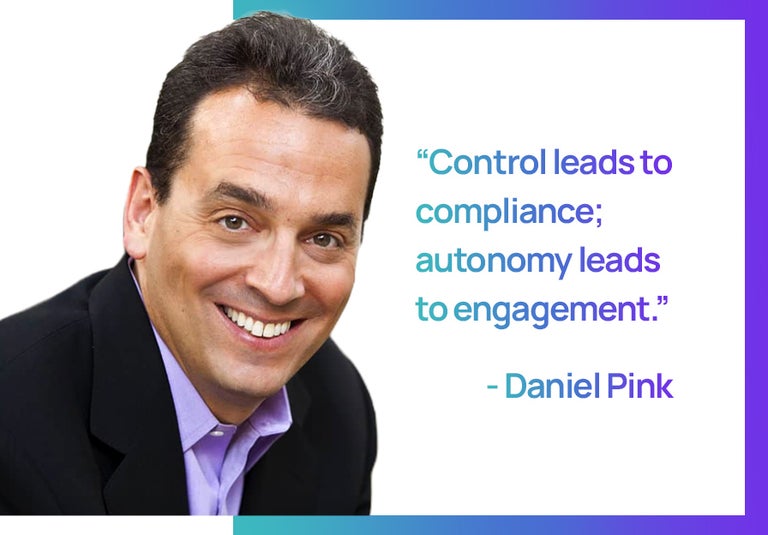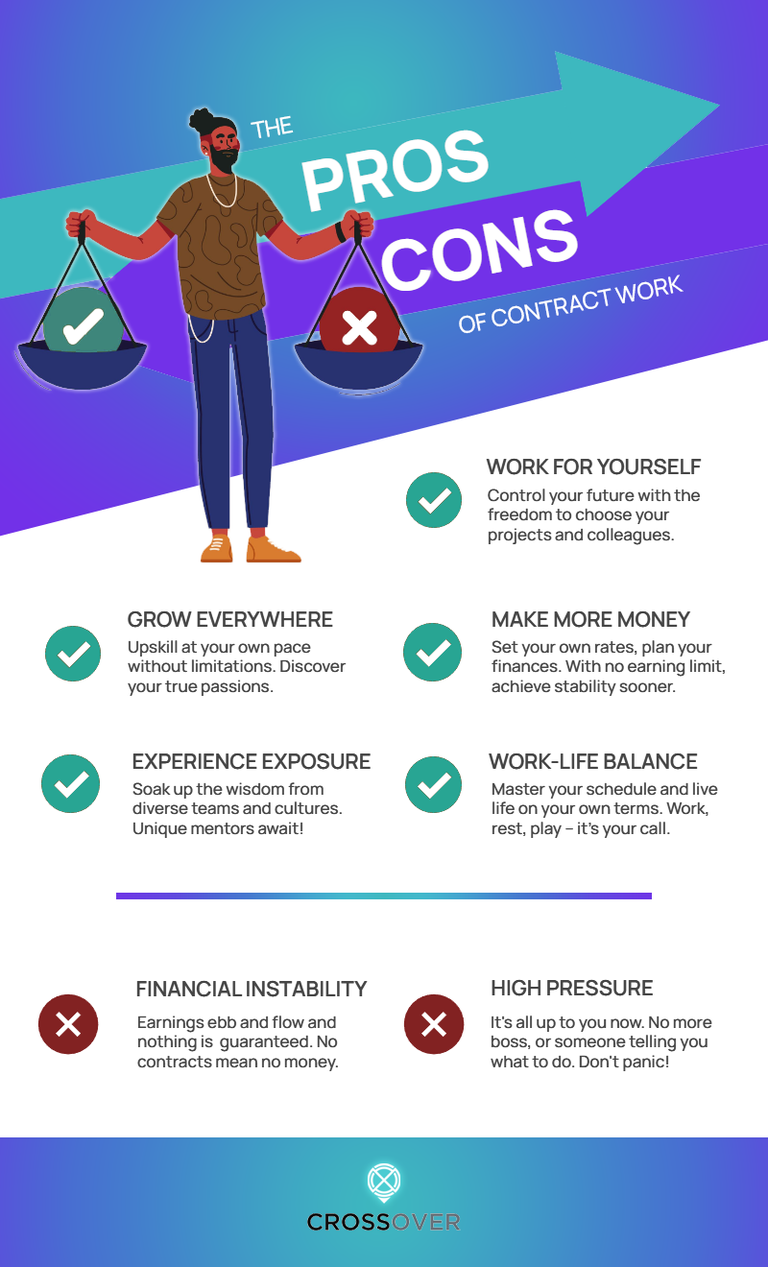Contents
- What is an Independent Contractor?
- The Benefits of Being an Independent Contractor
- The Disadvantages of Being an Independent Contractor
- Are You Ready to Be an Independent Contractor?
How do you weigh the pros and cons of contract work? Back when I was making the decision to become an independent contractor 10+ years ago, it seemed like mission impossible. The articles online were frustratingly vague, and I didn’t know anyone who was working a remote contract job, so I had no-one to ask.
Was I about to blow up my life for the abstract promise of freedom? I didn’t know, but I had to try.
So, I left my job at a start-up and embraced working remotely as an independent contractor. I’ve been doing it fulltime ever since, and today I’m going to help you decide whether the independent contracting life is for you.
Through the lens of someone who has been where you are now.
Excited? Here’s What to Expect
- What is an independent contractor?
- What are the advantages of contract work?
- What are the disadvantages you might encounter?
- Is being an independent contractor worth pursuing?
In the US alone the number of full time independent contractors increased from 13.6 million to 21.6 million in 2022. Experts are saying that 15% of the US workforce are contracting in some capacity now – amazing! This is a trend that extends far beyond the US, to loads of other countries.
The world of independent contracting is getting bigger, and there’s a place for you – if you want it.
But here’s a disclaimer:
The shift from being an employee to being a contractor is like the shift from renting a house to owning one. You’ll need to learn some new skills – whether it’s fixing a leaky faucet or filing taxes. You have to be resourceful, dedicated and ready to attack any new challenge with wild abandon, with everything you’ve got.
This is a life less ordinary.
Your mission – should you choose to accept it – will be action-packed with highs and lows, switching roles on a dime, and the kind of freedom you only hear about in the movies.
Ready for the pros and cons of contract work? Here’s what you need to know.
What is an Independent Contractor?
An independent contractor is a self-employed person who provides goods or services for an agreed fee. They provide goods or services according to the contract they have in place with that company.
What’s the Pay Difference?
Traditional jobs typically pay a fixed salary, which comes with value-adds like end-of-year bonuses, annual increases and non-cash incentives.
Contractor pay on the other hand, is an agreed upon amount that is meant to cover all of your needs. Your pay becomes an all-inclusive amount that you can use to take care of your responsibilities.
Pretty straightforward, right?
Much like a sole proprietor, an independent contractor doesn’t need to establish a company entity to conduct business. While some do this, the majority are sole traders, operating under their own names.
Types of Independent Contractor
There are lots of different types of contract worker and just as many terms to describe them.
You’ve probably heard of freelancers, consultants, gig workers and knowledge workers – but construction workers, doctors and even Uber drivers can be classified as contract workers.
For the sake of this post, I’m focusing on knowledge workers in tech who want to switch to contracting roles that are exclusively remote, so they can tap into the global demand for their skills.

Software engineers, financial analysts, customer support, sales, marketing specialists and creatives – this one’s for you.
Let’s crack into the pros of contract work.
The Benefits of Being an Independent Contractor
Not to be dramatic, but there are a LOT of advantages that come with contracting roles.
And while the stakes are high, so are the rewards.
#1: Work for Yourself
AKA: A Free Agent

The greatest advantage – by far – is the freedom to choose what happens in your day-to-day work life. Like a spy with no agency, you get to pick your own missions.
Independent contractors can:
- Choose who to work with
- When to work (& when not to)
- Where to work from
- How best to work
Now that’s ultimate freedom.
Boss mindset = better choices
For me, this meant choosing great clients and exciting projects where I could do my best work. But it also meant saying NO to clients or projects that weren’t a good fit.
Being an independent contractor taught me about the environments that wake me up or shut me down.
Because of that, I never waste time or energy being unhappy at work. Every day is something special because I authentically fall in love with the work I do.
Autonomy = engagement

Daniel Pink says, “Control leads to compliance; autonomy leads to engagement.”
We live in a stick-and-carrot culture of unrealized promises in the workplace. You’re made to wait for everything, from vacation days to pay increases, to end of the year bonuses. And if you don’t perform, you’re punished by having the little on offer taken away from you.
You’re on someone else’s timeline, focused on someone else’s mission.
A control-centric environment like the modern office strips people of their natural motivation. Being traumatized into performing is the opposite of feeling inspired to excel. But as Pink says in his classic ‘Drive,’ when people are given the freedom to act, to choose their work circumstances – they thrive.
Motivation is born from autonomy. That’s why 79% of people are more engaged when they have autonomy at work.
If you’re an independent contractor and are unhappy at work, there’s no-one to blame but yourself. So, you become great at decoding messages and surveilling the market for juicy opportunities.
There’s real power in that.
#2: Grow Wherever You Want
AKA: License to Upskill

The second pro is about personal growth, and finding what you love to do.
Most people get stuck in survival mode and forget that adventure lies beyond struggle. But if you’re surviving, you’re not focused on higher level needs like growth and development.
In your average 9-5, things are extremely regimental. You have to do something for a few years before you’re ready for a promotion.
Or you must work in a job you dislike, as a stepping stone to one you might like better in the future. It’s hard to test and learn what ignites your creativity.
As an independent contractor, you have a license to upskill. As fast as you like!
That means you:
- Have time to learn what you love most
- Find opportunities to practice skills you want to develop
- Learn at a faster pace without any restrictions
- Get challenged by bigger opportunities more often
Growth is something that determines your career trajectory, so this is no minor benefit. It’s the reason independent contractors reach rockstar status – they’re always adding to their value.
With 76% of Gen-Z saying that learning is the key to their advancement, there is no better way to learn than as an independent contractor. It helps you adopt the habit of growth.
#3: Massive Experience Exposure
AKA: Experience Espionage

This advantage isn’t talked about a lot, but it’s deeply valuable in contract work. The ability to witness and quietly soak up the intelligence of amazing colleagues you encounter.
When you work as an independent contractor you tend to join a lot of different team environments – way more than the average employee.
This is a secret weapon because it helps you learn from the experience of extraordinary people. I’ve picked up some amazing skills, processes and interests because I’ve worked with diverse teams from all over the world. Not just in my city.
It’s like having a never-ending supply of unique mentors.
For a time, you team up with someone who makes you better. You learn from each other in close proximity, you find yourself in the work you do together.
On-the-job remote contracting:
- Experience how different people operate
- See different communication styles in action
- Learn from a variety of cultures & workplaces
- Supersize your soft skills (& global etiquette)
- Learn to listen first, act fast, and keep evolving
- Develop on the job hard skills
- Build a network of highly skilled colleagues
It’s not only people you benefit from, it’s niches too.
Cross-functional skill sets get stronger, and you learn to see work through the perspective of other departments. This certainly helps you create value for the clients that you choose in future.
It’s also the reason why contractors tend to be Swiss army knives of end-to-end knowledge.
Multiple experiences make you a well-rounded team member – no matter what you’re doing.
Sure, you might have been hired as a bomb diffusion specialist, but you can fly a plane and decipher hidden messages like it’s nobody’s business.
The flipside of this is learning bad habits and outdated processes from a single work environment. Especially if that environment is highly controlling and leans into bureaucracy.
This kind of workplace experience creates super villains!
#4: You Make More Money
AKA: The High Roller

Here’s a hot take on contracting – it will almost definitely make you richer.
And that’s because you become a one-person business, a high roller with no earning limit.
When you’re in control of your own income, you earn more over time. Setting your own rates and adjusting your workflow to achieve what you need is part of the lifestyle.
Money becomes a plan to be realized instead of a passive paycheck.
No more struggling with a set salary that doesn’t measure up. No more waiting years to earn a little more. And no more worrying over a local currency that does not perform.
Bottom line: independent contractors grow their wealth sooner.
As an IC you need to understand money on a much deeper level than the average employee. This encourages you to learn more, and find ways to create financial stability, sooner rather than later.
- Set rates that reflect your true experience and value
- Get clued up about your taxes and tax breaks
- Earn more to save and invest at a younger age
- Set goals and use financial incentives to achieve them
- Earn global currency to insulate against local economic shifts
I’m a huge Ramit Sethi fan, and in his Netflix show he always says that the first step to wealth is ‘to earn more money.’ Take care of that, and the rest is much easier.
Tip: Read his essential book, “I Will Teach You to Be Rich.”
When you’re in control of your income, you have no earning limit. If you need to earn more because someone in your family has fallen ill, you can do that. If you need time off, you can plan ahead and take as many days as you need. Financial stability starts with flexibility.
A Global Mindset
The globalization of pay has made it possible to earn dollars no matter where in the world you live. So even if your local currency fails, inflation goes through the roof, or you need to suddenly relocate somewhere else – you can.
As an independent contractor you create your own income stability.
#5: Stronger Work-Life Balance
AKA: The High-Speed Chase

The last of the benefits is the flexibility that comes once you’ve mastered independent contracting. It’s a pro that tends to only kick in when you’ve learned how and are succeeding at it.
When you come from a place of workaholism, or being a master procrastinator – finding what your personal balance is can be challenging. It looks different for everyone.
Often it feels like a high-speed chase that never ends. But when you shift from the passenger to the driver’s seat, you can turn that chase into an escape.
For me it means having my weekends and evenings to be with my family.
Taking time for travel, for long walks, and achieving a laundry list of personal goals that I keep on an imposing whiteboard. It means having the flexibility to be human when human things happen.
- Never having to ask permission to be ill
- Hours that work into an ever-changing schedule
- Flexibility to be hyper-productive or to stack hours
- Never missing an important family event
- Jumping on a plane to work from somewhere else
Contracting is a balancing act. You have to learn your limitations first.
The beauty is that balance is achievable with this model because it works seamlessly with the flexibility and autonomy of the lifestyle. This is in stark contrast to spending time away at an office.
In the US, 94% of professionals work more than 50 hours, and they also work weekends. It’s impossible to find balance when that’s what it takes to get ahead.
But it’s not all jets and martinis.
The Disadvantages of Being an Independent Contractor
Here’s where things get interesting.
There are two BIG disadvantages to being an independent contractor. But only if you’re an analyst trying to be a field agent.
This is a controversial opinion, but I do believe that the traits that make you a successful contractor, negate a lot of the cons people speak about.
And look - no-one is going to hold your hand through this process, it’s all on you. Unlike spy movies, you’re not going to have a handler in your ear telling you what to do.
This kind of work is trial by fire. And a lot of people get burned.
Contract work requires resilience, determination and problem-solving on the fly.
If these are not traits oozing out of your every pore, you’ll want to work on them before quitting your job with a pithy AI generated resignation letter.
Here are the two biggest cons of contract work.
#1: Financial Instability
AKA: Paid Per Mission

Every contract worker has experienced times when there is no work. And no hours worked means you’re not getting paid. Worse still, you don’t have benefits to fall back on when the drought strikes.
- Weeks even months without work
- No paid time off or health insurance
- You have to pay your own taxes
- You have to buy and maintain your own tech
To someone used to the employee lifestyle this sounds devastating and extremely risky. And it is.
The best solution I’ve found is a long-term, high paying remote contract that provides you with ongoing income.
When you have a full-time remote contract in place, you have the stability of a full-time job with the freedom and flexibility of a seasoned freelancer. It’s the best of both worlds.
Crossover’s independent contractor model beats gig work any day. It’s a far superior model for individuals who love to work remotely, but also want to build reliable stability.
No more shopping around for clients, periods of no work, and gigs that don’t pay you what you’re worth. And when you focus on one job, you perform better – which is great for your career.
Crossover offers you higher pay, so that you can build your own financial security. That’s a win any way you look at it.
I would much rather be an independent contractor with stability and freedom, than locked into a devastating 9-5 at the office where I’m told how much life I get to enjoy.
Because I’ve invested in myself, my stability isn’t tied to someone else. Reaching a point where you’re confident enough to know that you can roll with any punches is perfect freedom.
There are lots of us who have been hired through Crossover – watch our stories here.
Crossover also hires employees on occasion (in the US) so inquire if that suits you better!
As for the other parts of financial management?
Get an accountant and use apps to help you with your taxes. Take out your own health insurance and policies.
You may miss out a bit on employee pension matching, but with a bit of savvy investing you can still benefit from compound interest to retire happy and comfortable.
And equipment? That’s a small price to pay for ownership and freedom to choose what you like.
#2: High Pressure
AKA: Rescuing Yourself

The second disadvantage of contract work is that it can be high pressure. The stress is real.
Starting out - you feel the pressure of uncertainty, with no safety net like a regular salary coming into your bank account each month.
The shift from being told what to do, to having to chart your own course can be jarring! And problems that crop up when you work for yourself are BIG.
If you don’t learn to solve them quickly, you can be left a burnt-out mess, with no money, and no energy. The cost of autonomy is stress, and it only eases when you’ve learnt how to manage your life, your family, your money, your schedule and everything in-between.
That learning curve is straight up. But I’ll say this, it teaches you to set hard boundaries and have contingency plans.
When I started out, I experienced everything from toxic clients who wouldn’t pay, to having my reputation threatened if I didn’t work for free. It’s on you to make things work. No-one is going to spoon-feed you anymore. And that’s scarily fantastic!
- Getting started means making a lot of mistakes
- Exposing yourself to loss, risk and failure often
- Contracts end without much notice
- You have to perform to succeed
- Living with income that fluctuates
Do you have main character energy? You’re going to need it. No-one’s going to save you if things go wrong. You are Sydney Bristow from Alias. You are Arnie in his new Netflix show Fubar. You’re the one that has the plan and the tricks up your sleeve to make it work.
Some people thrive when they’re challenged, and some break down. Be honest with yourself and work on your resilience to stress if it’s blocking you from what you want.
On the other side of this journey is less workplace discrimination, lower blood pressure, easier family life, greater health, and less stress than traditional workers enjoy.
Are You Ready to Be an Independent Contractor?
You’ve examined the pros and cons of contract work.

Question is, are you ready to make the shift?
After going through the highs and lows myself, I’m glad I did it. And while everyone’s journey is unique, contractors share a common set of traits.
If you’re a planner who loves independence and wants to find a way to accelerate the pace of your career (and the success that comes with it) – this might be your calling.
- Challenges wake you up, they don’t shut you down
- You’re a problem-solver, and a system builder
- When it comes to the crunch, you deliver on your mission
- You fit into any team environment, wherever they are in the world
- You can decode any message, regardless of communication style
- You can adapt to any schedule, and learn on-the-go
- You know how to be your best, and perform at your highest level
If these resonate with you, then the independent contractor life is within your reach. You will get to design what your ideal work life looks like. From how much you earn, to where you work.
Nothing is more worthwhile than that.
So quit being the henchman in someone else’s story. The pros far outweigh the cons!
The world of independent contracting is packed with thrilling missions filled with opportunities for growth, income elevation, and global experience. Come on, you’re basically an international spy.
Like any major operation, it comes with its share of risks. But those of you who approach this adventure with resilience, adaptability, and a knack for problem-solving will fall in love with the exciting and autonomous lifestyle of an independent contractor.
Now it’s time to make this mission possible.
[Get That High Paying Contract]








